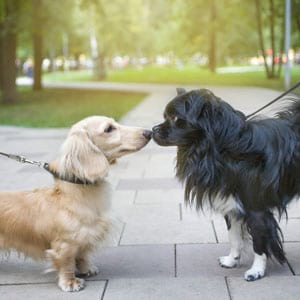Public space
Pets
![]() CONTEXT
CONTEXT
In accordance with the First Study on Pets in Catalonia, in Catalonia there are some 1,023,847 registered pets. Of them 91.6 % are dogs (938,254), 7.6 % are cats (78,130), 0.4% are ferrets and the remaining 0.4% are other animals and exotic species (birds, turtles, rabbits, etc.). It has also been found that 30% of homes in Barcelona have a pet. Pets are therefore a prevalent presence in our society.
Pets benefit the health of their owners (they favour physical activity and contact with other people, they help children learn about commitment, and they provide emotional comfort and physical support as guard and defence animals), but they can also be a nuisance for other people and in cities it is not always easy to get along with one’s neighbours. Dogs have different needs in terms of the public space to those of people, given that the use they make of it goes beyond walking and exercise and they use it for their physiological needs.
The presence of faeces in the public space is a constant source of complaints and conflict. In addition to being an unsanitary presence in the public space, faeces can spread zoonoses caused by intestinal parasites (helminths, protozoa, etc.), and they can cause accidents (slips and falls) and an aversion to dogs (people are disgusted by seeing them and treading in them). Another aspect to consider is dog urine, especially that of males, who urinate to mark their territories. This instinctive behaviour is also a source of problems (e.g. smell, dirt, deterioration of urban furniture and facades). The various dissuasive systems, both chemical substances (sulphur, pheromones, etc.) and physical elements, have not proven to be very effective.
Another social aspect to take into account is favouring the accessibility of people who use support dogs, which are authorised by law to access practically all public spaces.
![]() OBJECTIVE
OBJECTIVE
- Minimise the adverse effects that the presence of dogs has on the sanitary conditions of the public space by installing specific elements on the streets and designing common areas for pets.
- Favour leisure spaces where the interaction of dogs and people does not generate conflict.
![]() PROPOSALS AND RECOMMENDATIONS
PROPOSALS AND RECOMMENDATIONS
- Provide elements (e.g. special bins for faeces) to make it easier for people walking their dogs in the public space to meet their obligations.
- Install points to tie up dogs outside establishments if they are not permitted to enter.
- Design marking elements for dogs in the street to prevent them from dirtying the public space with their faeces and urine (building facades, parked vehicles, etc.) and ensure that these elements are connected to the sewerage network.
- Have communal spaces with large leisure areas equipped with elements to allow dogs and their owners to play, exercise, walk, meet friends, etc. Have fountains where dogs can drink. These must be designed in such a way that the dogs cannot directly touch the tap.
- Take into account the presence of guide dogs for the blind or visually impaired and those suffering other problems. They should have free access to all public spaces.
The regulations recognise:- Guide dogs: dogs trained to guide a visually impaired or deaf person.
- Service dogs: dogs trained to help people with a physical disability in their everyday activities both in private and in external environments.
- Hearing-ear dogs: dogs trained to warn the hearing impaired of different sounds and indicate their source.
- Seizure response dogs: dogs trained to raise the alarm and provide assistance for people who suffer epilepsy, diabetes or any of the diseases recognised in accordance with section one of final provision two.
- Dogs for people with autism spectrum disorders: dogs trained to look after the physical integrity of people with disorders on the autism spectrum, guide them and control any emergency situations that may arise.
![]() REFERENCE EXPERIENCES
REFERENCE EXPERIENCES
Information only available in Catalan
- Ajuntament de Barcelona. L'Ajuntament de Barcelona disposa de 129 pipicans (vàters per a gossos) i zones d'esbarjo per a gossos.
- La fundació Affinity va realitzar una proposta de com podria ser un espai destinat als animals de companyia. Campanya "Un lugar bajo el sol".
- Hi ha una proposta de com pot ser un dispositiu per a que l'orina no sigui tan molesta. Es tracta d'un dispositiu vertical amb una reixa a la part de baix per on s'escola l'orina la qual va a parar a un desguàs, que s'ha instal·lat en una prova pilot a Sedavi (Valencia).
- The Park Spark Project, projecte per aprofitar els excrements com a font de biogas i alimentar punts de llum en els parcs públics.
![]() LEGISLATION
LEGISLATION
- Llei 19/2009, del 26 de novembre, de l'accés a l'entorn de les persones acompanyades de gossos d'assistència.
- Orden 14 junio 1976 (Ministerio de Gobernación). Perros y gatos. Normas sobre medidas higiénico sanitarias.
- Decret legislatiu 2/2008, de 15 d'abril, pel qual s'aprova el Text refós de la Llei de Protecció dels Animals.
- Real Decreto 3250/1983, de 7 de diciembre, por el que se regula el uso de perros-guía para deficientes visuales.
![]() STUDIES AND TECHNICAL DOCUMENTATION
STUDIES AND TECHNICAL DOCUMENTATION
- Agència de Salut Pública de Barcelona. División de Vigilancia y Servicios. Animales de compañia: beneficios e inconvenientes.
- Ajuntament de Barcelona. Guies pràctiques per al civisme. Animals de companyia.
- Wood, Lisa, 2009. Living Well Together - How Companion Animals can help Strengthen Social Fabric. Petcare information & Advisory Service.
More information about addressing the Public Health Service: entornurbasalut@diba.cat
Date of last update:
dg., 09 de maig 2021 17:20:10 +0000








 CONTEXT
CONTEXT 
 OBJECTIVE
OBJECTIVE  PROPOSALS AND RECOMMENDATIONS
PROPOSALS AND RECOMMENDATIONS  REFERENCE EXPERIENCES
REFERENCE EXPERIENCES  LEGISLATION
LEGISLATION  STUDIES AND TECHNICAL DOCUMENTATION
STUDIES AND TECHNICAL DOCUMENTATION 

